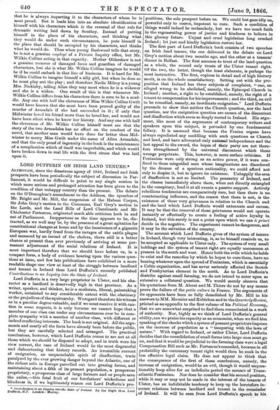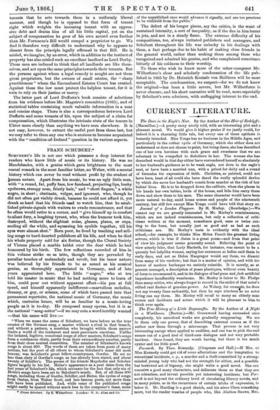LORD DUFFERIN ON IRISH LAND TENURE.* AfurwouGH, since the disastrous
agony of 1846, Ireland and Irish prospects have been periodically the subject of discussion in Par- liament, it would be difficult to point to any single session in which more serious and prolonged attention has been given to the condition of that unhappy country than the present. The debate on the O'Donoghue's amendment to the Address, the speeches of Mr. Bright and Mr. Mill, the suspension of the Habeas Corpus, Sir John Gray's motion in the Commons, Earl Grey's motion in the Lords, and the Land Bills of Lord Clanricarde and Mr. Chichester Fortescue, originated much able criticism both in and out of Parliament. Inopportune as the time appears to be, dis- tracted, as we well may be, by the presence of a great agitation for constitutional changes at home and by the imminence of a gigantic European war, hardly freed from the ravages of the cattle plague and menaced by an inroad of the cholera, there still is a better chance at present than ever previously of arriving at some per- manent adjustment of the social relations of Ireland. It is most important therefore that we should have before us, in a compact form, a body of evidence bearing upon the various ques- tions at issue, and few late publications have exhibited in a more readable shape one view at least of the struggle between landlord and tenant in Ireland than Lord Dufferin's recently published Contributions to an Inquiry into the State of Ireland.
Lord Dufferin is a very large proprietor in Ulster, and his cha- racter as a landlord is deservedly high in that province. As a writer, speaker, and thinker, he is a moderate, liberal, painstaking worker, untainted to any considerable extent with the obstinacy or the prejudices of the squirearchy. Weregard therefore his witness as in a peculiar degree valuable, and if we must receive it with cau- tion in some respects, it is only because we cannot hope that a member of one class can under any circumstances ever be in com- plete sympathy with a member of another class, with different or indeed conflicting interests. The book is not original. All the argu- ments and nearly all the facts have already been before the public, but they are carefully selected and arranged. The practical conclusions, however, which Lord Dufferin comes to are not at all those which we should be disposed to adopt, and in truth were his view correct, the case of Ireland would be the most disgraceful and disheartening that history records. An irresistible current of emigration, an unquenchable spirit of disaffection, trade paralyzed by the ever growing danger beyond the Atlantic, one of the richest soils in Europe parcelled out into grazing farms, and maintaining about a fifth of its present population, a prosperous proprietary, a prosperous claw of large farmers and no people save the exiles,—this fatal fruit of our forefathers' wickedness and blindness is, if we legitimately reason out Lord Dufferin's pro-
* ContribagioNs to at Inquiry inio IA. Mate of Ireland. By the Right Hon. Lord Dufferin, ALP. London: Murray.
positions, the sole prospect before us. We could but gaze idly on, powerful only to coerce, impotent to cure. Such a condition of things would indeed be melancholy, but we have too much faith in the regenerating power of justice and kindness to believe in this gloomy future. Unjust and cruel legislation long crushed Ireland ; let just and kindly legislation restore her.
The first part of Lord Dufferin's book consists of two speeches on Irish land tenure, the one delivered in the debate on Lord Grey's motion about two months ago, and the other at a tenants' dinner in Belfast. The first assumes to treat of the land question as a whole, the second only treats of the Ulster tenant right. Of the two, the latter, though the least elaborate, is perhaps the most instructive. The first, copious in detail and of high literary merit, is on the whole unsatisfactory. Setting out with the pro- position that Ireland has three subjects of complaint, " one, an alleged wrong to be abolished, namely, the Episcopal Church in Ireland ; another, a right to be established, namely, the right of a tenant to compensation for his improvements ; and the third, an evil to be remedied, namely, an inordinate emigration." Lord Dufferin proceeds to show that neither the Church question, nor the land question, nor the emigration question are causes of the discontent and disaffection which seem so deeply rooted in Ireland. His argu- ment, like most of the arguments of contemporary writers and speakers upon this subject, is pervaded by one fundamental fallacy. It is assumed that because the Fenian organs have always repudiated any meddling with such questions as Church and land, and have advocated only natiosal independence and the last appeal to the sword, the hopes of their party are not there- fore strengthened by the universal discontent which those wrongs perpetrate. This, however, is mere surface criticism. If Fenianism were only strong as an active power, if it were con- fined to those misguided men whose imaginations are disordered by the dreams of a spurious nationality, we could afford not only to despise it, but to ignore its existence. Unhappily the area of disaffection is not so limited. The peasantry of Ireland, and the classes immediately above them, when not directly entangled in the conspiracy, lend it at all events a passive support. Actively rebellious tendencies are comparatively rare, but then there is no counteracting influence, and the reason that there is not, is the existence of those very grievances in relation to the Church and. and the land which Lord Dufferin would extenuate and excuse. Itmay be that the removal of these grievances would not operate instantly or effectually to create a feeling of active loyalty in Ireland, but this surely is not a point upon which we can if priori decide in the negative. The experiment cannot be dangerous, and it may be the salvation of the country.
The account which Lord Dufferin gives of the system of tenure in Ireland, though very interesting, is, as he himself reminds us, to be accepted as applicable to Ulster only. The system of very small holdings and the system of tenant right are equally uncommon at present in the south and west. Hence both the evils which be holds to exist and the remedies by which he hopes to cure them, have no bearing whatever upon the spread of Fenianism, which is essentially a Celtic organization, and has never seriously affected the Scotch and Presbyterian element in the north. As to Lord Dufferin'a diatribe against small farming, we do not intend to enter upon so extensive a collateral question. We would merely observe that his quotations from M. About and M. niers do not by any means prove the failure of the petite culture in France. The arguments of its opponents have been so fully demolished by Mr. Mill in his answers to MM. Mounier and Rubichon and to the QuarterlyReview, printed as an appendix to the first volume of his Political Economy, that we are somewhat surprised to find them resuscitated in a work of authority. Nor, highly as we think of Lord Dufferin's general ability, can we praise his capacity as an economist, when we find hint speaking of the checks which a system of peasant proprietors imposes on the increase of population as a "tampering with the laws of nature." With regard to Ireland, or rather Ulster, Lord Dufferin decides that the consolidation of small farms into large ones must go on, and that it would be prejudicial to the farming class were a legal Compensation Bill such as Mr. Fortescue's conceded, because in all probability the customary tenant right would then be sunk in the less effective legal claim. He does not appear to think that the consequence of the first of these conclusions, namely, the increase of emigration, would be an evil, though it would unques- tionably keep alive for an indefinite period the menace of Trans- atlantic Fenianism. Nor does he consider that his second position, while it may or may not be made in the interest of the tenants of Ulster, has an indubitable tendency to keep up the heretofore in- secure relations between landlord and tenant in the remainder of Ireland. It will be seen from Lord Dufferin's speech to his tenants that he acts towards them in a uniformly liberal manner, and though he is opposed to that form of tenant right which weights the incoming tenant with an oppres- sive debt and drains him of all his little capital, yet on the subject of compensation he goes of his own accord even further than Mr. Fortescue's Bill would compel a proprietor to go. We find it therefore very difficult to understand why he appears to dissent from the principle legally affirmed in that Bill. He is misled, we imagine, by an error, which in addition to the instinct of property has also misled such an excellent landlord as Lord Derby. These men are induced to think that all landlords are like them- selves, and act upon the same principles towards their tenants. But the persons against whom a legal remedy is sought are not these great proprietors, but the owners of small estates, the "sharp practitioners" whom the Encumbered Estates Court has created. Against these the law must protect the helpless tenant, for it is vain to rely on their justice or mercy.
The latter part of Lord Dufferin's book consists of selections from his evidence before Mr. Maguire's committee (1865), and of statistical tables containing much valuable information in a neat and concise shape. There is also a correspondence between Lord Dufferin and some tenants of his, upon the subject of a claim for compensation, which illustrates the intricate state of the tenure in Ulster more clearly than anything we have seen elsewhere. It is not easy, however, to extract the useful part from these last, but we may refer to them any one who is anxious to become acquainted with the " condition-of-Ireland " question in its various aspects.































 Previous page
Previous page